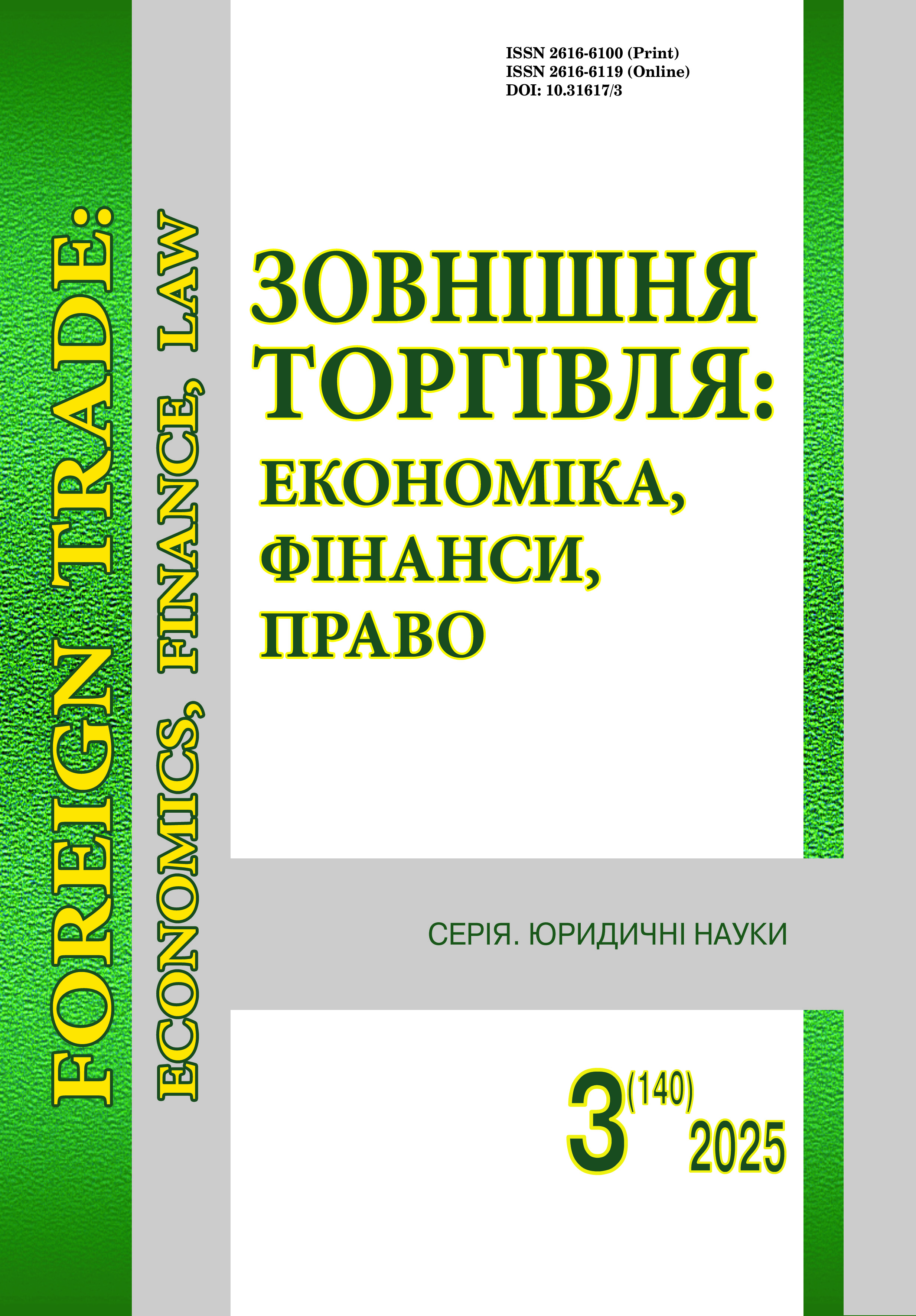FRAND in the system of overcoming unfair competition
DOI:
https://doi.org/10.31617/3.2025(140)07Keywords:
FRAND, SEP, competition, patent rightsAbstract
The risks and abuses related to licensing standard-essential patents (SEPs) on fair, reasonable, and non-discriminatory (FRAND) terms have been studied. The main focus is on analyzing practices such as patent hold-up (abuse of the exclusive right of the SEP holder), patent ambush (concealed patenting with an attempt of gaining benefits after standardization), royalty stacking, and hold-out (the refusal of a licensee to conclude an agreement). The judicial and regulatory practices of the EU and the USA have been analyzed, showing that non-compliance with FRAND commitments leads to market monopolization, hinders the implementation of innovations, and creates barriers to fair competition. It has been proven that effective application of the FRAND mechanism is a key tool in countering the abuses of SEP holders. A special emphasis is placed on the Ukrainian context: it is noted that there is a lack of specific regulation of SEP/FRAND, which creates potential risks for the development of the telecommunications and technology sectors. The directions for improving legislation taking into account foreign experience have been proposed. The research hypothesis is that proper implementation of FRAND commitments is a necessary condition for reducing anticompetitive risks. The research methodology is based on formal-legal, comparative-legal, and analytical methods, using case law, regulatorʼs policies, and doctrinal sources.
References
Abramson, B. D. (2011). The patent ambush: Misuse or caveat emptor? IDEA: The Intellectual Property Law Review, 51(1), 71-124. https://ipmall.info/sites/default/files/hosted_resources/IDEA/idea-vol51-no1-abramson.pdf
Contreras, J. L. (2015). A market reliance theory for FRAND commitments and other patent pledges. Utah Law Review, 2015(2), Art. 5. http://dc.law.utah.edu/ulr/vol2015/iss2/5; https://doi.org/10.63140/pmwhi0vddt DOI: https://doi.org/10.63140/pmwhi0vddt
Court of Justice of the European Union (CJEU). (2015). Huawei Technologies Co. Ltd v ZTE Corp. and ZTE Deutschland GmbH (Case C-170/13). EUR-Lex. https://eur-lex.europa.eu/legal-content/EN/TXT/?uri =celex:62013CJ0170
Epstein, R. A. (2017). The property rights foundations of antitrust. Berkeley Technology Law Journal, 32(4), 1239-1278. https://btlj.org/data/articles2017/vol32/32_4/Epstein_web.pdf
European Commission. (2014, April 29). Summary of Commission Decision relating to a proceeding under Article 102 of the Treaty on the Functioning of the European Union and Article 54 of the EEA Agreement (Case AT.39985 - Motorola - Enforcement of GPRS standard essential patents). Official Journal of the European Union, C 349, 6-7. https://eur-lex.europa.eu/legal-content/EN/TXT/PDF/?uri=CELEX:52014XC1002(01)
European Commission. (2023). Proposal for a regulation on standard essential patents (COM(2023) 232 final). https://www.europarl.europa.eu/RegData/etudes/BRIE/2023/754578/EPRS_BRI(2023)754578_EN.pdf
European Union. (2012). Consolidated version of the Treaty on the Functioning of the European Union. Official Journal of the European Union, C 326, 47-390. http://data.europa.eu/eli/treaty/tfeu_2012/oj
Federal Trade Commission. (2012). Amicus curiae brief of the Federal Trade Commission in support of neither party, Apple Inc. and NeXT Software, Inc. v. Motorola, Inc. and Motorola Mobility, Inc., Nos. 2012-1548, 2012-1549. https://www.ftc.gov/sites/default/files/documents/amicus_briefs/apple-inc.and-next-software-inc.v.motorola-inc.and-motorola-mobility-inc./121205apple-motorolaamicusbrief.pdf
Federal Trade Commission. (2013). Motorola Mobility LLC and Google Inc., In the matter of (FTC File No. 121-0120). https://www.ftc.gov/legal-library/browse/cases-proceedings/1210120-motorola-mobility-llc-google-inc-matter
Geradin, D. (2020). SEP licensing after two decades of legal wrangling: Some issues solved, many still to address (TILEC Discussion Paper No. DP2020-040). Tilburg Law and Economics Center. https://papers.ssrn.com/sol3/papers.cfm?abstract_id=3547891; https://doi.org/10.2139/ssrn.3547891 DOI: https://doi.org/10.2139/ssrn.3547891
Gupta, I., Devaiah, V. H., & Bhushan, S. (2019). Shifting focus on hold-out in SEP licensing: Perspectives from the EU, USA and India. Journal of Intellectual Property Law & Practice, 14(1), 12-17. https://doi.org/10.1093/jiplp/jpy094 DOI: https://doi.org/10.1093/jiplp/jpy094
Lemley, M. A., & Shapiro, C. (2007). Patent holdup and royalty stacking. Texas Law Review, (85), 1991-2049. https://papers.ssrn.com/sol3/papers.cfm?abstract_id=923468
U.S. Department of Justice & U.S. Patent and Trademark Office. (2013). Policy statement on remedies for standards-essential patents subject to voluntary F/RAND commitments. https://www.justice.gov/atr/page/file/1118381/dl?inline=
United States Court of Appeals for the Federal Circuit. (2008). Qualcomm Inc. v. Broadcom Corp., No. 2007-1545. Justia. https://law.justia.com/cases/federal/appellate-courts/cafc/07-1545/07-1545-2011-03-27.html
United States Court of Appeals for the Federal Circuit. (2014). Apple Inc. and NeXT Software, Inc. v. Motorola, Inc. and Motorola Mobility, Inc., Nos. 2012-1548, 2012-1549. https://law.justia.com/cases/federal/appellate-courts/cafc/12-1548/12-1548-2014-04-25.html
United States Court of Appeals for the Ninth Circuit. (2015). Microsoft Corp. v. Motorola, Inc., No. 14-35393. Justia. https://law.justia.com/cases/federal/appellate-courts/ca9/14-35393/14-35393-2015-07-30.html
United States Court of Appeals for the Ninth Circuit. (2020). FTC v. Qualcomm Inc., No. 19-16122, 969 F.3d 974 (9th Cir. 2020). https://cdn.ca9.uscourts.gov/datastore/opinions/2020/08/11/19-16122.pdf
United States Court of Appeals for the Ninth Circuit. (2020). FTC v. Qualcomm Inc., No. 19-16122, 969 F.3d 974 (9th Cir. 2020). https://cdn.ca9.uscourts.gov/datastore/opinions/2020/08/11/19-16122.pdf
Law of Ukraine "On Protection of Economic Competi-tion" No. 2210-III dated January 11, 2001 (as amended). (2001). https://zakon.rada.gov.ua/laws/show/2210-14#Text
Law of Ukraine "On Protection of Rights to Inventions and Utility Models" No. 3687-XII dated December 15, 1993 (as amended). (1993). https://zakon.rada.gov.ua/laws/show/3687-12
Law of Ukraine "On Standardization" No. 1315-VII dated June 5, 2014 (as amended). (2014). https://zakon.rada.gov.ua/laws/show/1315-18#Text
Additional Files
Published
How to Cite
Issue
Section
License

This work is licensed under a Creative Commons Attribution 4.0 International License.
This work is licensed under a Creative Commons Attribution 4.0 International (CC BY 4.0)







